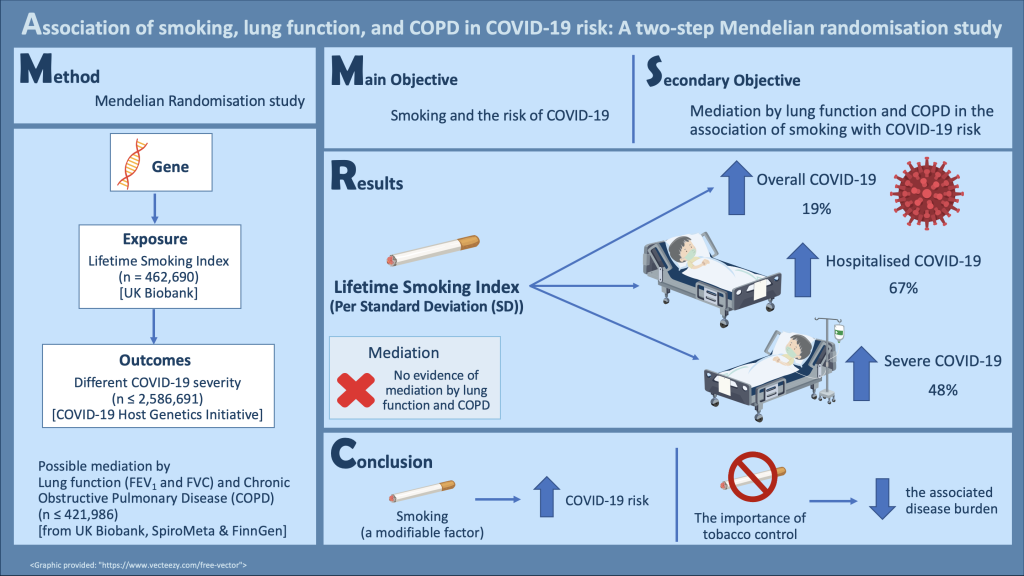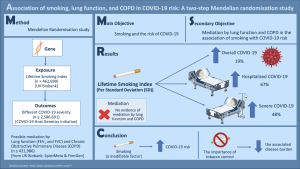CUHK
News Centre
A joint HKU-CUHK study finds that smoking increases the risk of COVID-19
Researchers from the School of Public Health, LKS Faculty of Medicine of The University of Hong Kong (HKUMed), in collaboration with The Chinese University of Hong Kong’s (CUHK) Faculty of Medicine (CU Medicine), discovered a causal link between smoking and a higher risk of contracting mild to severe COVID-19, using data from large scale genome-wide association studies. The findings have been published in Addiction, a leading peer-reviewed substance use journal. [Click here to view the publication]
Examining the association between smoking and milder forms of COVID-19
Previous observational studies[i] showed mixed results concerning smoking and COVID-19 risk, possibly driven by confounding factors arising from lifestyle, such as obesity, or biases by design which are difficult to account for in observational studies. Although more recent studies[ii], including genetic studies have indicated a possible link between smoking and severe COVID-19 risk, the association between smoking and milder forms of COVID-19, which account for the majority of COVID-19 cases, remains unclear. Understanding the role of smoking in COVID-19 risk is particularly important given smoking cessation services are readily available in Hong Kong and could play a role in reducing COVID-19 cases in the community.
In this connection, the research team set out to explore the role of smoking in various severities of COVID-19 risk using a method called Mendelian randomisation. As genetic variants are used, this approach may circumvent some of the limitations present in conventional observational epidemiologic studies. The secondary objective is to explore the role of lung function and chronic obstructive pulmonary disease (COPD), known detrimental effects of smoking, in explaining the association of smoking with COVID-19 risk.
Using Mendelian randomisation, researchers extracted genetic variants related to smoking, proxied by the lifetime smoking index which captures smoking behaviour such as heaviness, duration and initiation, from a previous genetic study (N=462,690), and assessed their relation with COVID-19 risk from large genetic summary data of genome-wide association studies (N<=2,586,691).
The research team found that an increase in the lifetime smoking index (per standard deviation), which implies a heavier smoking behaviour throughout the lifetime, is likely to increase the risk of contracting (both mild and severe forms) COVID-19 by 19%, as well as to increase the risk of severe COVID-19 by 48%. However, lung function and COPD did not appear to mediate these associations. ‘Using a less biased design, our study highlights the role of smoking in increasing the risk of contracting COVID-19, including the milder forms, and clarifies confusion based on previous epidemiologic studies. These further substantiate the importance of smoking cessation in reducing the risk of contracting COVID-19, alongside the known fact that smoking is a major cause of poor health and reduces lifespan,’ said Dr Ryan Au Yeung Shiu-lun, Assistant Professor, Division of Epidemiology and Biostatistics of the School of Public Health, HKUMed.
Highlighting COVID-19 as a harm associated with smoking behaviour
This is one of the first and largest studies to explore the role of smoking in different severities of COVID-19 using Mendelian randomisation, and it also implies smoking cessation services could be considered to reduce the risk of spreading COVID-19 in the community. ‘From a public health perspective, highlighting COVID-19 as another harm associated with smoking behaviour could be explored to further enhance the uptake of smoking cessation services amongst smokers, or reduce the initiation of smoking amongst non-smokers. These would not only curb the number of COVID-19 cases in the community but also improve overall population health given that smoking is a major cause of several diseases, such as cardiovascular disease and cancer’, added Dr Au-Yeung.
‘Although the databases used for this study are predominantly related to European populations, it is unlikely that the detrimental effect of smoking in COVID-19 risk differs in other ethnic populations. Nevertheless, replication of these findings using genetic databases in non-European populations would be valuable to provide context specific evidence to support public health policies. Smokers are at a higher risk of contracting COVID-19 and more likely to have severe COVID-19 symptoms, which is why it is imperative for them to receive COVID-19 vaccinations as soon as possible,’ said Professor Kwok Kin-on, Assistant Professor, The Jockey Club School of Public Health and Primary Care, CU Medicine.
[i] Simons D, Shahab L, Brown J, Perski O. The association of smoking status with SARS-CoV-2 infection, hospitalization and mortality from COVID-19: a living rapid evidence review with Bayesian meta-analyses (version 7). Addiction. 2021 Jun;116(6):1319-1368
[ii] Clift AK, von Ende A, Tan PS, et al. Smoking and COVID-19 outcomes: an observational and Mendelian randomisation study using the UK Biobank cohort. Thorax 2022;77:65-73.





